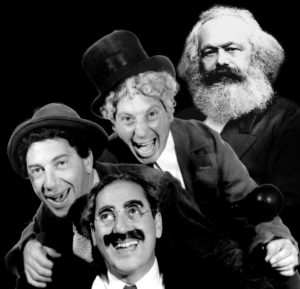Sister Society: Association Internationale Jacques Ellul
Sister Society: Association Internationale Jacques Ellul
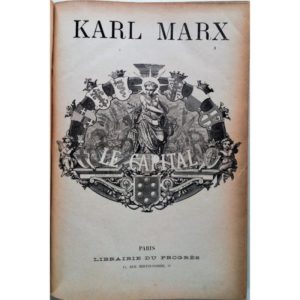
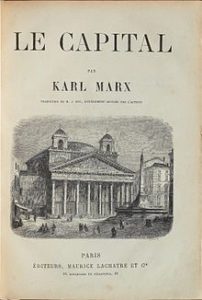
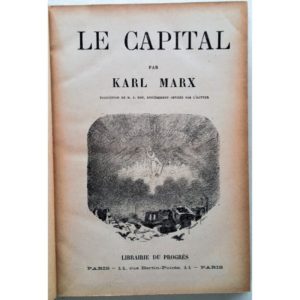
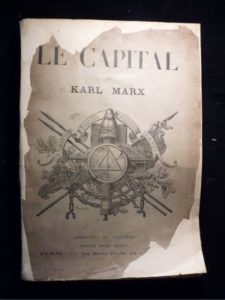
Ellul’s understanding of history and his interpretation of the Bible were largely influenced by his reading of Karl Marx. Ellul first discovered the writings of Marx when he was eighteen years old. At the time, his father was unemployed and Ellul was supporting his family while attending law school. He writes:
I was in the depth of despair.…I borrowed Das Kapital from the library and started reading it.…I discovered a global interpretation of the world, the explanation for this drama of misery and decadence that we had experienced. The excellence of Marx’s thinking, in the domain of economic theory, convinced me.[1]
It was from this moment that Ellul would go on to read Marx and engage with his thought for the remainder of his life.[2]
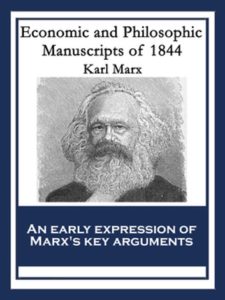 Ellul regularly used Marx’s concepts throughout his work. One of the clearest examples of this appropriation is Ellul’s use of the concept of alienation. In Marx’s early works, especially his Economic and Philosophic Manuscripts of 1844, the term alienation is employed.[3] As a consequence of capitalism and increased industrial growth, alienation is a state of being in which individuals are separated from their natural state of existence. For Marx, those who live in a capitalistic state are alienated from their loved ones, spending long hours in the workplace; alienated from themselves, losing their sense of creativity, purpose, and meaning; alienated from nature, spending the majority of their lives on an assembly line or in a factory or mill; and alienated from the fruit of their labor, never free to access the products or profit they generate at work.
Ellul regularly used Marx’s concepts throughout his work. One of the clearest examples of this appropriation is Ellul’s use of the concept of alienation. In Marx’s early works, especially his Economic and Philosophic Manuscripts of 1844, the term alienation is employed.[3] As a consequence of capitalism and increased industrial growth, alienation is a state of being in which individuals are separated from their natural state of existence. For Marx, those who live in a capitalistic state are alienated from their loved ones, spending long hours in the workplace; alienated from themselves, losing their sense of creativity, purpose, and meaning; alienated from nature, spending the majority of their lives on an assembly line or in a factory or mill; and alienated from the fruit of their labor, never free to access the products or profit they generate at work.
Ellul largely agreed with Marx’s theory of alienation but sees alienation through a different lens. For Ellul, technique—not capitalism—is the primary cause of alienation in the modern world. Once one is continually enveloped in the technological milieu, one begins to mirror the values of technique: efficiency, power, and violence, among others. When one’s life is guided by these values, one will certainly become separated from authentic relationships with others, oneself, and nature.
Along with technique, propaganda is another primary cause of alienation today, says Ellul. Advertisers, politicians, and others employ psychological manipulation in order to control the masses. One of the largest components of this propaganda involves appeals to fear. Fear of terrorism, fear of financial insecurity, and even fear of illegal immigrants, for example, cause a large segment of the population to live in constant anxiety. Living in a continual state of alarm and worry, year after year, leads to profound alienation.[4]
Marx as a Challenge to Christians
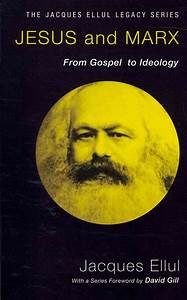 While utilizing Marx’s theory of alienation as a component of his social criticism, Ellul also utilized five broad aspects of Marx’s thought to challenge his Christian readers.[5] The first of these aspects is the opposition to social injustice. For Marx, the goal of capitalism is to efficiently gain profit. This inevitably leads to the worship of money. When capital is valued over the health and well-being of individuals, injustice is necessarily caused. Not only humans but nature are exploited for monetary gain. Ellul believes that Christians should, like Marx, take these injustices seriously and work toward creating communities which abolish the worship of money and its deleterious effects.
While utilizing Marx’s theory of alienation as a component of his social criticism, Ellul also utilized five broad aspects of Marx’s thought to challenge his Christian readers.[5] The first of these aspects is the opposition to social injustice. For Marx, the goal of capitalism is to efficiently gain profit. This inevitably leads to the worship of money. When capital is valued over the health and well-being of individuals, injustice is necessarily caused. Not only humans but nature are exploited for monetary gain. Ellul believes that Christians should, like Marx, take these injustices seriously and work toward creating communities which abolish the worship of money and its deleterious effects.
Second, Marx always sided with the poor. Throughout his work, Marx fiercely advocates for the oppressed, the exploited, and the marginalized. Ellul agrees with Marx as one who stands with the poor. He states: “The poor person is indeed a person who requires a response; his very existence questions our lives.”[6] Furthermore,
It is the way the power of money works. Its most tangible form is what we call slavery, but we must realize that the poor person’s situation is not much different from that of a slave. According to the Bible, it is extremely easy to slip from poverty into slavery. The purchase of a slave is the purchase not only of a body but of the whole person. Poverty also leads to the total alienation of the poor, an alienation which puts the labor force at the disposal of the wealthy, permitting the wealthy to impose their own law and conception of life, their own thought and religion.[7]
The worship of money in our modern society leads to increasing selfishness and greed. Poverty and slavery are also common outcomes. Ellul argues that many Christians give lip service to the poor, but in reality they do little to help. Christians must work against those conditions and act as true advocates of the poor.
In addition, Ellul believed that Christians often lack coherence when it comes to praxis—uniting theory with concrete practice. Here he turns to a third aspect of Marx’s thought: his articulation of the necessity of praxis. “For Marx, a sound ideology is possible only if it is related to a sound praxis.”[8] Throughout his life Ellul strove to live out his Christian faith in a practical, tangible way. For example, beginning in 1958, Ellul and his colleague Yves Charrier started an organization for marginalized young people, many of whom were living in poverty or on the streets. This organization gave free instruction in canoeing and kayaking, metal and wood shop, and even opened a beauty parlor for young women from the streets to learn how to become beauticians.[9] Ellul was actively involved in this work for many years, and it is only one example of how Christians might combine thought and action.[10]
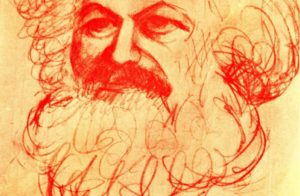

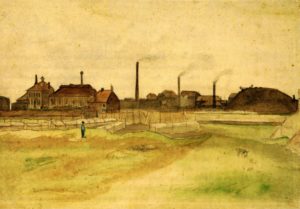
The fourth concept Ellul advocates is Marx’s concern with the concrete rather than with abstract theories, which is evident from his oft quoted statement: “The philosophers have only interpreted the world, in various ways; the point is to change it.”[11] Ellul agrees wholeheartedly with this sentiment. In fact, Ellul maintained that many Christians have lost touch with the emphasis on the concrete found in the Bible. Ellul pointed to the prophets of the Hebrew Scriptures, who were not primarily concerned with abstract belief, but with actually aiding the widow and the orphan. Ellul writes: “The prophet is in effect the man who brings the Word of God to bear on the actual, concrete situation of man, his political situation.”[12] And, “Man is thus summoned to participate in one or another of the actions of the Holy Spirit, in the totality of the work of God. He is summoned to provide the basis for the divine efficacy.”[13]
Furthermore, Ellul argued that there is strong emphasis on the concrete in the New Testament, and points to two striking examples. First, it is clear that in the life and miracles of Jesus were largely of a material nature—curing disease, restoring life, multiplying bread, and more. Second, Ellul maintained that the incarnation is a concrete embodiment of God’s love for humanity and the earth—not an abstract one. He explained:
As for Jesus, a simple reminder of His incarnation betrays the dreadful error involved in a disembodied Christianity. One can also see in the Gospels the importance of daily life, the body, and the undivided unity of being. Thus, [contemporary] Christianity has utterly betrayed the very essence of revelation by transforming it into religious spirituality.[14]
Along with other material emphases in the Old and New Testaments, the incarnation illustrates, like Marx stressed, concrete involvement in our communities should be taken seriously. Ellul calls upon Christians to take concrete action, but unlike Marx, argues that they should resist employing violent means or putting their faith in material successes. In other words, Christians must refuse to engage in propagandistic techniques (psychological violence) or physical violence, and they should never try to calculate the success of their actions. Instead, Christians must live day by day, guided by the Holy Spirit, placing the final outcome of their actions in God’s hands.[15]
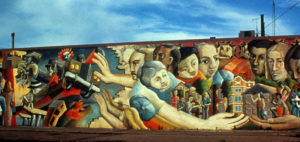 Marx’s ultimate aim was the well-being, cooperation, and thriving of community, and Ellul points to this as the fifth and final aspect of Marx’s thought to challenge Christians. Ellul believed that today’s Christianity is highly individualistic and has lost sight of the communitarian emphasis in the Bible. He writes: “Christianity has perverted Christian action by reducing it to a matter of individual conversion.”[16] Instead of narcissistic individualism, Ellul urges us to return to the scriptures where we read, “All who believed were together and had all things in common; they would sell their possessions and goods and distribute the proceeds to all, as any had need. Day by day, as they spent much time together in the temple, they broke bread at home and ate their food with glad and generous hearts,…” and “The whole group of those who believed were of one heart and soul, and no one claimed private ownership of any possessions, but everything they owned was held in common.”[17] These are but a few biblical examples of the radical emphasis on community that Ellul begs contemporary Christians to recall and adopt.[18]
Marx’s ultimate aim was the well-being, cooperation, and thriving of community, and Ellul points to this as the fifth and final aspect of Marx’s thought to challenge Christians. Ellul believed that today’s Christianity is highly individualistic and has lost sight of the communitarian emphasis in the Bible. He writes: “Christianity has perverted Christian action by reducing it to a matter of individual conversion.”[16] Instead of narcissistic individualism, Ellul urges us to return to the scriptures where we read, “All who believed were together and had all things in common; they would sell their possessions and goods and distribute the proceeds to all, as any had need. Day by day, as they spent much time together in the temple, they broke bread at home and ate their food with glad and generous hearts,…” and “The whole group of those who believed were of one heart and soul, and no one claimed private ownership of any possessions, but everything they owned was held in common.”[17] These are but a few biblical examples of the radical emphasis on community that Ellul begs contemporary Christians to recall and adopt.[18]
For Ellul, Marx was a prophet. Marx fought against injustice, emphasized praxis, and reminded his followers to reject narcissistic individualism. Marx also—and perhaps most importantly for Ellul—urged us to focus on the direction of history and to understand that we have a role to play in this unfolding drama. Ellul believed that many Christians have lost sight of the meaning and purpose of history and of the revolutionary responsibility they are called to take in this process. He emphasized that Marx is crucial in regaining this focus.
When reading Marx, I was brought back to the social and political proclamations of the prophets.… It was Marx who convinced me that people in the various historical situations they find themselves, have a revolutionary function in regard to their society. But one must understand exactly which revolution it is; and in each historical period one must change, one must rediscover.[19]
By becoming aware of history and our unique place within it, we must become revolutionary. For Ellul this may entail nonviolent resistance against a particular state or political entity. It will always, however, involve a fight against the myths and idols, the principalities and powers which continue to dehumanize individuals and destroy the earth.
Differences and Conclusion
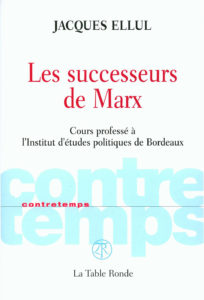
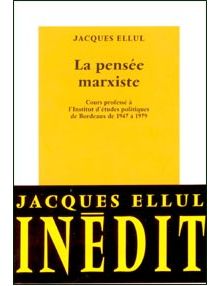 Along with Kierkegaard and Barth, Marx was one of the primary influences on Ellul’s thought as demonstrated above. Ellul viewed Marx primarily as a prophetic social critic. Marx encouraged people to wake up from the slavery and idolatry of capitalism. The various forms of Marxism which would evolve in the twentieth century (Leninism, Stalinism, Maoism, et. al.) were not faithful to Marx’s vision, according to Ellul. These “Marxisms” were primarily top-down, dictatorial forms of socialism, whereas Marx’s vision of social equality was bottom-up, grass-roots, and democratic. Furthermore, as mentioned earlier, Ellul believed that Marx himself got some things wrong. For example, instead of capitalism leading to alienation, Ellul argues that it is technique which is the driving force. Also, Marx views human nature as fundamentally inclined toward unselfishness, while Ellul accepts the Christian doctrine of original sin. Additionally, Marx was an atheist, whereas Ellul was uncompromisingly theistic. And, Marx viewed history as working toward the eschaton of socialism, while Ellul believed that history was working toward reconciliation with God.
Along with Kierkegaard and Barth, Marx was one of the primary influences on Ellul’s thought as demonstrated above. Ellul viewed Marx primarily as a prophetic social critic. Marx encouraged people to wake up from the slavery and idolatry of capitalism. The various forms of Marxism which would evolve in the twentieth century (Leninism, Stalinism, Maoism, et. al.) were not faithful to Marx’s vision, according to Ellul. These “Marxisms” were primarily top-down, dictatorial forms of socialism, whereas Marx’s vision of social equality was bottom-up, grass-roots, and democratic. Furthermore, as mentioned earlier, Ellul believed that Marx himself got some things wrong. For example, instead of capitalism leading to alienation, Ellul argues that it is technique which is the driving force. Also, Marx views human nature as fundamentally inclined toward unselfishness, while Ellul accepts the Christian doctrine of original sin. Additionally, Marx was an atheist, whereas Ellul was uncompromisingly theistic. And, Marx viewed history as working toward the eschaton of socialism, while Ellul believed that history was working toward reconciliation with God.
In the final analysis, Ellul clearly had a dialectical relationship with Marx—agreeing and appropriating some of Marx’s thought, and disagreeing with and rejecting some of Marx’s thought. Ellul did, however, believe that Marx was one of the most important thinkers of the modern era, and that all thinking individuals should engage deeply with Marx’s writings.

Coke Factory by Vincent Van Gogh (1879)
Footnotes
This essay is an excerpt from “Oui et Non: Jacques Ellul’s Dialectical Engagement with Karl Marx” (a chapter in Political Illusion and Reality: Engaging the Prophetic Insights of Jacques Ellul. Pickwick, 2018.
[1] Ellul, In Season, Out of Season, 10-11.
[2] It should also be noted that, according to Patrick Chastenet, Ellul first came across Karl Marx during an economics lecture at university in 1929-1930. Ellul was quite taken with Marx, but “was extremely disappointed when he actually met some communist workers who were much more concerned with toeing the party line than with hermeneutic Marxism.” Ellul and Troude-Chastenet, Jacques Ellul on Politics, Technology, and Christianity, pg. 4.
[3] For some key passages in Ellul’s work on alienation see, The Ethics of Freedom, 23-47; Propaganda, 169-182; The Technological Society, 423; Money and Power, 20-21, 78; The Technological System, 18; The New Demons, 207; To Will and To Do, 14, 41.
[4] Ellul, Propaganda, 169-182.
[5] Frédéric Rognon insightfully explains these characteristics. See Jacques Ellul: Une pensée en dialogue, 211-233. Geneva: Labor et Fides, 2013. For the most accurate information regarding Ellul’s views on Marx, see the work of Patrick Chastenet. Chastenet was an assistant to Ellul while the latter taught University courses on Marx. See A Contre-Courant: Entretiens, conversations between Ellul and Chastenet for enlightening details about Ellul relationship to Marx, the anarchists, and politics in general.
[6] Ellul, Money and Power, 142.
[7] Ibid., 78.
[8] Ellul, Jesus and Marx, 115.
[9] Ellul, In Season, Out of Season, 119-120.
[10] See Ellul, “Un club de prévention.” In discussing his time working with marginalized youth in Bordeaux, Ellul emphasizes that he never tried to “moralize” or convert young men and women to Christianity. By providing free living arrangements and instruction on a variety of practical subjects, youth were able to stay out of trouble with the law and become less self-destructive. Ellul writes “In reality, it is not the youth who are maladjusted to society, but our society which is maladjusted to human beings.” “Un club de prévention,” in Foi et Vie, 3-4, July, 1989, 77.
[11] Marx, “Theses on Feuerbach,” in The German Ideology, 123.
[12] Ellul, Politics of God, Politics of Man, 50.
[13] Ibid., 135.
[14] Ellul, Jesus and Marx, 8.
[15] Ellul, Politics of God, Politics of Man, 136.
[16] Ellul, Jesus and Marx, 8.
[17]Acts 2: 44-46; 4:32 NRSV.
[18] For an insightful commentary on these passages in relation to community in the primitive church, see José Miranda, Communism in the Bible. Maryknoll, NY: Orbis, 1982.
[19] Ellul, Perspectives on Our Age, 13, 11. Ellul’s deep knowledge of Marx is best seen in two books which have yet to be translated into English. The first, La pensée marxiste (2003), is presentation of Marx’s thought and includes a detailed discussion of dialectic, materialism, labor and surplus value, capital, ideology, the state, and alienation. The second book, Les successeurs de Marx (2007), is primarily a presentation of major Marxist thinkers (Jean Jaurès, Georges Sorel, Eduard Bernstein, Karl Kautsky, Vladimir Lenin, Rosa Luxemburg, Georgi Plekhanov, Radovan Richta, and Ota Šik) and an explanation of the divergent paths of Marxist thought. Both books were compiled from courses Ellul taught at the Institute of Political Studies at Bordeaux between 1947 and 1979.
